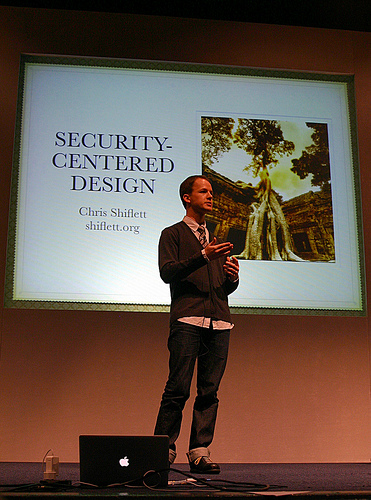While reading Ben Ramsey’s blog post “The Fall of PEAR and the Rise of Composer“, I caught myself thinking of entirely different subject – technical conferences, in general. Two bits in particular pushed my train of thought.
The first one is Ben’s experience as a first time speaker at a technical conference. We’ve all probably been to one or seen one on YouTube, but that’s from the audience perspective. Here is how it looks from the other side:
Palms sweaty, stomach aflutter with butterflies, I stood before my first audience as a technical speaker. It was a time of many firsts for me—my first PHP conference, my first time in Europe, my first technical presentation. I had been accepted to speak at the 2005 International PHP Conference Spring Edition in Amsterdam. I was nervous, jet-lagged, and tired from an all nighter working on slides.
[…]
After my presentation, I found myself downstairs during the break, discussing the topic of frameworks with a German gentleman. I don’t recall much of our conversation, but after a while, I made the biggest mistake I have ever made in my entire career as a speaker. I asked the question “how did it go?”
“Oh, I think we both know how it went,” responded the gentleman drily.
“No. No, I don’t think I do. Can you elaborate?” My second mistake.
“It was horrible!” he exclaimed.
Wow. I was floored. I had to get out of the conversation quickly. I thanked him for his frankness and excused myself. I found a quiet room and sat down for a while, taking deep breaths, trying to calm myself and recover before giving a second talk that day. If I was nervous before, I was frantic now. I didn’t think I could muster up the courage to give another presentation, but I pressed on, and I’m better for it.
That day, I learned two valuable lessons: 1) after giving a presentation never, ever, ever, ever ask someone how they thought it went; let them volunteer that on their own, and 2) unless you want a brutally honest response, don’t ask a German for their opinion.
I haven’t spoken at any major events yet – just a couple of local Linux user group meetings – but I can attest to the very humbling and crushingly nervous experience. It gets easier, I guess, but who would want to listen to you when your first few times suck so badly?
The second bit that got me thinking was the this one:
At php|tek 2009, a group of leaders from a few of the frameworks and libraries communities got together to, as David Coallier described, “develop a set of common standards which PHP projects can strive towards adopting.” This moment represented a turning point in the PHP community. All modern PHP development hinges on this moment. As the Doctor might say, it is a fixed point in time.
This group produced what would become known as PSR-0, an autoloading standard for PHP userland frameworks and libraries, and the group’s name would eventually become the PHP Framework Interop Group (PHP-FIG). It was this autoloading standard that I think changed the course of all PHP userland development.
Quite a few people I know are under the impression that technical conferences are a waste of time. People just go there to escape a day or two from their work. And maybe learn a thing or two. But it’s not just that. It’s not only about the sessions, workshops and learning.
A great deal of networking and cross-industry communication happens at these events. Some of these just forge friendships and beer sessions. Yet others develop into powerful partnership and great accomplishments. Like the one mentioned above.
Like it or not, but even the techiest of techiest among us need an occasional face-to-face session to fix “lost in translation” things, to discuss and argue about everything, and agree on something.
